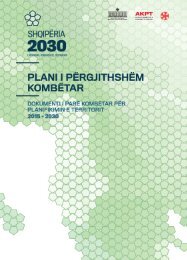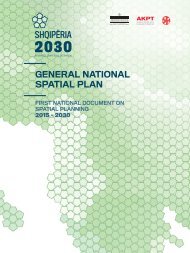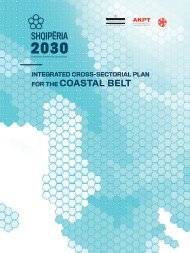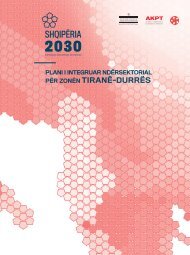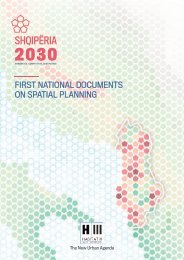Integrated Cross-Sectorial Plan of Tirana-Durres Area
The Albanian Government and the National Spatial Plan have identified the Tiranë-Durrës area, as one of the most important economic areas of the country, and of the Balkan region. To ensure a sustainable territorial and urban development of this area, the Ministry of Urban Development in cooperation with the National Territorial Planning Agency has taken the initiative to draft a Cross-sectoral Integrated Plan for the economic area Tiranë – Durrës. The metropolitan region under study includes territories administered by 5 municipalities: Tiranë, Durrës, Vorë, Shijak, Kamëz.
The Albanian Government and the National Spatial Plan have identified the Tiranë-Durrës area, as one of the most important economic areas of the country, and of the Balkan region. To ensure a sustainable territorial and urban development of this area, the Ministry of Urban Development in cooperation with the National Territorial Planning Agency has taken the initiative to draft a Cross-sectoral Integrated Plan for the economic area Tiranë – Durrës. The metropolitan region under study includes territories administered by 5 municipalities: Tiranë, Durrës, Vorë, Shijak, Kamëz.
Create successful ePaper yourself
Turn your PDF publications into a flip-book with our unique Google optimized e-Paper software.
Guidelines for the development <strong>of</strong> urbannatural<br />
tourism<br />
• Tourism and development infrastructure<br />
The provision <strong>of</strong> quality tourist infrastructure<br />
is a prerequisite for attracting investment and<br />
tourists in the region. The main components<br />
<strong>of</strong> tourist infrastructure include road, rail,<br />
airport access, low cost airfares, road<br />
transport facilities, accommodation facilities<br />
(hotels, motels, hostels, youth hostels, etc.),<br />
restaurants, tour operators, attractive tourist<br />
websites, tourist shops, etc. Regional / local<br />
identity should be maintained when developing<br />
supportive infrastructure with public or private<br />
developers to help tourists find the local<br />
experience in this region.<br />
Local government structures should promote<br />
the development <strong>of</strong> new tourism products<br />
with appropriate infrastructure, such as<br />
the establishment <strong>of</strong> centres <strong>of</strong> culture and<br />
specialized education in potential locations;<br />
construction <strong>of</strong> entertainment parks for<br />
children; creating the necessary conditions in<br />
favour <strong>of</strong> outdoor adventure (rock climbing,<br />
mountain biking, sport fishing, parachuting,<br />
water sports, outdoor walking, etc.). These<br />
areas should be equipped with basic tourism<br />
infrastructure such as: public toilets,<br />
prohibition <strong>of</strong> crossing through risky spots,<br />
information centres, fuel stations, police<br />
stations, first aid centres, play areas, shelters,<br />
telephone booths and parking areas along<br />
the roads <strong>of</strong> the tourist destination. The local<br />
government should mobilize the private<br />
investments <strong>of</strong> the region, to build services and<br />
tourism infrastructure.<br />
In particular, information infrastructure needs<br />
to be improved and built in road entries <strong>of</strong><br />
the regional tourist corridors and attractive<br />
tourist poles; electricity and digital (ICT)<br />
supply should be improved; public transport<br />
in tourist poles should be improved; airport<br />
services and low cost mobility should be<br />
improved; new attractive poles based on<br />
perennial tourism should be developed;<br />
services should be improved with a view<br />
to increasing the tourist stay in regional<br />
destinations; non-elite-only hotel structures<br />
should be developed, but also in the service<br />
<strong>of</strong> young people based on youth tourist poles<br />
supported by urban, rural and natural all-year<br />
events. Local and regional government should<br />
develop short and medium term strategies<br />
to integrate various tourism typologies with<br />
tourist packages, in order to attract certain<br />
sectors <strong>of</strong> the global tourism market. The<br />
regional tourism board, and regional or central<br />
government tourism support departments<br />
should prepare strategies and action plans<br />
for regional tourism development. These<br />
strategies should create synergies and<br />
cooperation with the needs and conditions<br />
<strong>of</strong> stakeholder development from the private<br />
sector, conducting ongoing consultations on<br />
infrastructural requirements and support to<br />
specific regional destinations.<br />
• Ensuring quality<br />
It is imperative to set standards and quality<br />
regime for operating structures such as<br />
hotels, restaurants, tour operators, travel<br />
agencies and other touristic service providers.<br />
These standards have to be adopted on a<br />
large scale, they should be presented with<br />
interest groups in order to agree upon and<br />
ensure quality, followed by a strong compliance<br />
and monitoring regime. This standard and<br />
certification regime should be linked to similar<br />
international regimes, aiming to approximate<br />
with the standards <strong>of</strong> European countries.<br />
International certification will be very useful<br />
for businesses, consumers, government,<br />
local communities, and no less for the<br />
environment. For business, this will help to<br />
improve the quality <strong>of</strong> their services and unfair<br />
competition, reducing operating costs and<br />
providing an edge to long-term marketing<br />
and branding strategies. In addition to<br />
providing opportunities for economic benefits<br />
to local communities, certification also<br />
provides enhanced opportunities to respect<br />
and promote local culture and tradition. For<br />
governance, certification will raise industry<br />
standards in areas such as health, safety, the<br />
environment, social and economic stability, and<br />
will lower the cost <strong>of</strong> support and regulatory<br />
services.<br />
• Creating a business environment for<br />
investment<br />
The success <strong>of</strong> tourism in the metropolitan<br />
area is based on the synergy between the<br />
public and private sector. Governance should<br />
104










